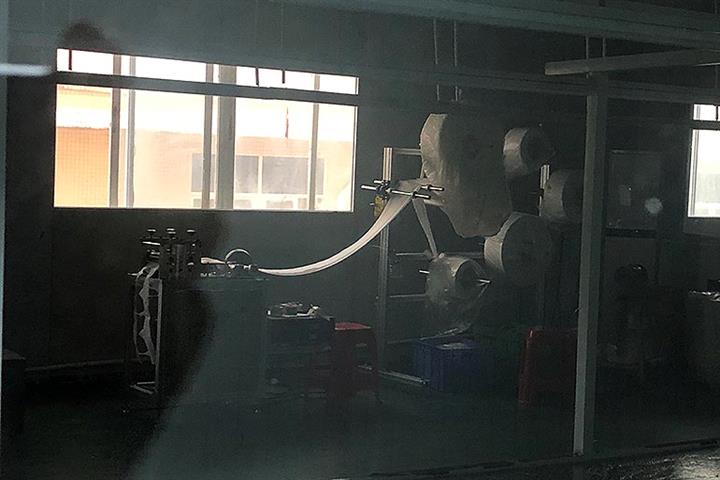 Mask Machines Turn From Treasure to Trash as Covid-19 Slows
Mask Machines Turn From Treasure to Trash as Covid-19 Slows(Yicai Global) June 12 - As the new coronavirus pandemic loosens its grip on China, demand for and hence production of masks have also begun to wane, and mask-making equipment once hailed as the goose that laid the golden eggs during the outbreak has become virtually worthless.
Many mask manufacturers in the Pearl River Delta region, China's main production area for the facial coverings and the machinery that produces them, have ceased production and mask machine equipment has also fallen off sharply, a survey by Yicai Global in the area found.
Before the epidemic, the price of a fully automatic mask set was only about CNY150,000 (USD21,254) and the factory profit of about CNY10,000 or CNY20,000 (USD1,400) was deemed quite considerable. The price rose to several hundred thousand yuan or even millions, for which buyers had to pony up in full when the pandemic peaked.
But all this changed as the coronavirus began to slacken and demand for masks evaporated.
Zhejiang businessman Wang Zhe opened his closed mask production workshop in Dongguan in southern Guangdong province on June 2 and took Yicai Global to view the mask machine he had bought at such an extortionate price such a short time ago. Compared with the overtime production scene in the workshop two nights back, it is now silent.
Treasure Turns to Trash
The mask production line in another workshop a few kilometers away has also fallen still. "[It] stopped a few days ago; manufacturers would rather cease running than keep it operating and make a loss," factory staff told Yicai Global. Our reporter also saw an idled production line in the factory of mask maker Li Cheng in a small town in the region.
"Production equipment bought for hundreds of thousands of yuan or even millions of dollars will soon become a pile of useless scrap iron," local manufacturer Guo Jie told Yicai Global.
Output of ordinary masks has produced a glut and the market for medical mask production equipment with higher specifications has also cooled down, a man surnamed Nie who sells mask machines in Dongguan, told Yicai Global. The KN95 mask machine the company makes, which had been quoted as high as CNY1 million (USD142,000), now generates almost no interest. “We cannot even make an offer now as the price is constantly declining. All we can do is let our clients decide, they can even buy them at CNY200,000 apiece.”
Wooing Whitelisting
The mask industry in the Pearl River Delta is currently polarized, our reporter's field investigation discovered. Companies that make it onto the Ministry of Commerce's export ‘whitelist’ issued on April 26 are still running full bore and aiming for the overseas market; but those who fail to make the cut either keep applying or seek cooperation with qualifiers, otherwise they will drown amid the competition.
The whitelist refers to the mechanism imposed by China’s Ministry of Commerce for masks and other items for prevention of Covid-19 on April 26 to set the norms for product quality. Only manufacturers enrolled in the white list can qualify to export their products.
Guo's company appeared among the 960 newly added companies officially announced on June 5.
"We are very fortunate we finally got the qualification, and we can drive overseas orders with full horsepower," Guo told Yicai Global, but now the price of masks is cheap, as long as the company can recover the previous losses, it will not be too bad.
Wave Amplification
The frenzied purchase of mask machines a few months ago was because of the seemingly infinite growth of mask demand after the outbreak, Guo believes. "This was originally a 'fake market' where demand information was over-amplified. After domestic companies credited this exaggerated demand information, they immediately added mask machine equipment and started full-scale production, which eventually led to these terrible consequences."
Li's company does not feature on the new list. Considering that 70,802 mask companies were newly registered in the country in the first five months, most of these are in trouble if they do not make the grade since they face bleak domestic market prospects.
(Guo Jie, Wang Zhe, Li Cheng are all pseudonyms at the request of these interviewees)
Editor: Tang Shihua, Ben Armour